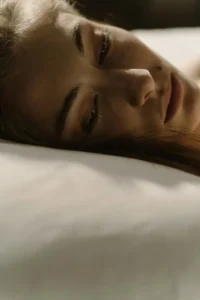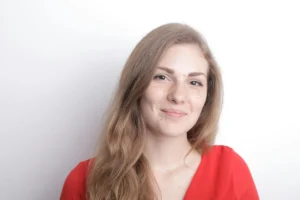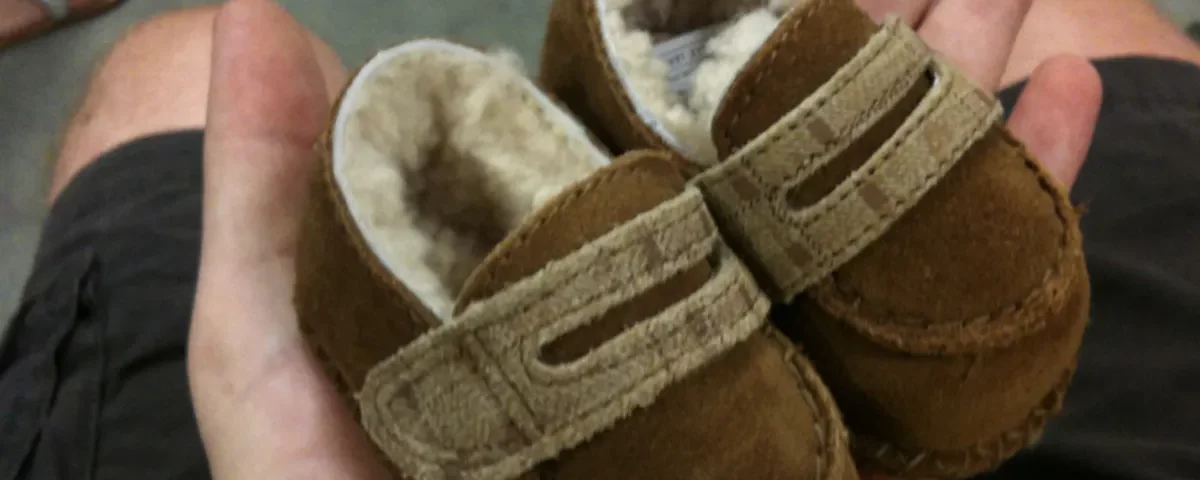I never thought a $5 pair of baby shoes would change my life, but when I slipped them onto my son’s feet and heard a strange crackling sound, everything I thought I knew shifted.
My name’s Claire. I’m 31, a single mom, and most days I feel like I’m running on fumes. I wait tables at a diner three nights a week, take care of my three-year-old son, Stan, and look after my mother, who’s been bedridden since her second stroke. My life is this strange mix of exhaustion and urgency, like I’m always one unpaid bill away from everything collapsing.
Some nights, I lie awake listening to the hum of the old fridge, wondering how long I can keep this pace before something gives out.

I didn’t always live like this. Mason and I were married for five years. Back then, we shared dreams of a modest home and a big backyard where our son could play. But all of that crumbled when I found out he was cheating on me — with a woman named Stacy, of all people. She used to be our neighbor. I still remember the way he looked at me when I confronted him, like I was the one who’d ruined everything.
When we divorced, he somehow convinced the court to let him keep the house. He said it was better for Stan to have a “stable environment” — even though Stan doesn’t even live with him full-time.
Now Mason plays house with Stacy while I scrape together rent for a rundown two-bedroom that smells like mildew in the summer and freezes over in the winter. The faucet leaks and the heater rattles, but that’s all I can afford.
Some nights I catch myself driving past that house, watching their lights glow in the windows, and it feels like I’m staring at the life that was supposed to be mine.
So yeah — money’s tight. Painfully tight.
It was a foggy Saturday morning when I found myself at the edge of a flea market, clutching the last $5 bill in my wallet. I had no business being there, but Stan had outgrown his sneakers again. His toes had started curling at the tips, and every time I saw him trip, I felt this crushing guilt settle in my chest.
“Maybe I’ll get lucky,” I muttered, pulling my coat tighter against the cold.
The market stretched out across an empty parking lot, with rows of mismatched tables and old tents piled high with forgotten things waiting for a second chance. I wandered past chipped mugs, tangled cords, and plastic crates filled with yellowing books. The air smelled of damp cardboard and stale popcorn.
Stan tugged on my sleeve. “Mommy, look! A dinosaur!”
I glanced down. He was pointing at a broken figurine missing half its tail. I smiled weakly.
“Maybe next time, sweetheart.”
That’s when I saw them.
A pair of tiny brown leather shoes. Soft, worn-in, but in amazing shape. The stitching looked perfect, and the soles barely had a mark. They were toddler-sized, just right for Stan.
I rushed over to the vendor, an older woman with short gray hair and a thick knitted scarf. Her table was covered in odds and ends — picture frames, costume jewelry, and some old purses.
“How much for the shoes?” I asked.
She looked up from her thermos and smiled warmly. “Six dollars, sweetheart.”
My heart sank. I held out the crumpled bill between my fingers. “I only have five. Would you… maybe take that?”
She hesitated. I could see the conflict flicker across her face. Then she nodded slowly.
“For you, yes.”
I blinked, surprised. “Thank you. Really.”
She waved it off. “It’s a cold day. No child should be walking around with cold feet.”
As I walked away with the shoes tucked under my arm, it felt like a small victory. Nothing life-changing, but enough to make me feel like I’d managed to protect my son in the tiniest way. The leather felt soft under my arm, and for the first time that week, the weight on my chest eased just a little.
Back home, Stan was on the floor, building lopsided towers with his plastic blocks. He looked up as I stepped in.
“Mommy!”
“Hey, buddy,” I said, putting on my best cheerful voice. “Look what I got you.”
His eyes widened. “New shoes?”
“Yep. Try them on.”
He sat on the floor, legs stretched out. I helped him slide them on, gently tugging the leather over his socks. They fit like a dream.
But then we both heard it, a soft crackling sound from inside one of the shoes.
Stan frowned. “Mom, what’s that?”
I paused, confused. I pulled off the left shoe and pressed down on the insole. There it was again — a quiet crinkle, like paper rubbing against itself.
My stomach turned. I reached into the shoe and slowly lifted the padded insert.
Tucked underneath was a piece of paper, neatly folded, its edges yellowed with time. The handwriting was small, almost cramped, but unmistakably human. My hands trembled as I opened it.
Stan leaned closer, his tiny hands clutching my knee as if he already sensed this was no ordinary secret.
“To whoever finds this:
These shoes belonged to my son, Jacob. He was only four when he got sick. Cancer stole him from me before he even got the chance to live his childhood. My husband left us when the medical bills piled up. Said he couldn’t handle the ‘burden.’ Jacob never really wore these shoes. They were too new when he passed away. I don’t know why I’m keeping them. I don’t know why I’m keeping anything. My home is full of memories that choke me. I have nothing left to live for. If you’re reading this, please just… remember that he was here. That I was his mom. And that I loved him more than life itself.
—Anna.”
I stared at the letter, the words blurring as tears welled up. My throat tightened. I covered my mouth, trying to breathe.
“Mommy?” Stan’s voice was soft. He tugged at my arm. “Why are you crying?”
I wiped my cheeks and forced a smile. “It’s nothing, baby. Just… dust in my eyes.”
But inside, I was unraveling. I didn’t know who Anna was or how long ago she had written that note. All I knew was that somewhere, a mother like me had poured her grief into these shoes and now her story had landed in my lap.
That night, I couldn’t sleep. I kept thinking about her, about Jacob, and about the grief tucked inside that little note. It felt like more than a coincidence, more like fate was nudging me awake.
By the time the sun came up, I knew what I had to do.
I had to find her.
The next Saturday, I went back to the flea market. The fog hung low again, and my heart raced as I walked toward the woman who had sold me the shoes. She was setting out her usual mix of trinkets and scarves when I approached.
“Excuse me,” I said, clutching my hands together. “Those little leather shoes I bought from you last week… Do you remember where they came from?”
The woman frowned, her eyes narrowing as she tried to recall. “Oh, those? A man dropped off a bag of children’s clothes. He said his neighbor was moving and asked him to get rid of them.”
“Do you know the neighbor’s name?” I pressed.
She tilted her head, thinking hard. “I think he said her name was Anna.”
That single word was enough to push me forward. I thanked her and left with my heart racing. All week, I couldn’t shake the thought of Anna. I asked around at the diner, checked Facebook community groups, and even scrolled through obituaries late into the night. After days of searching, I finally found her: Anna Collins, in her late 30s, living in a run-down house only a few miles away.
The following Saturday, I drove there with Stan strapped in the back seat. My stomach was in knots the entire ride. When I pulled up, the house looked abandoned — weeds clawed through the yard, shutters hung crooked, and the curtains were drawn tight. For a moment, I wanted to turn the car around and leave. But then I remembered the note in my drawer and the way her words had broken me.
I walked up to the porch and knocked. At first, there was nothing, only silence. Then slowly, the door creaked open.
A woman appeared. She looked fragile, her hair dull and limp, her frame so thin I wondered when she had last eaten. Her eyes were hollow, rimmed with red as if she had been crying for years.
“Yes?” Her voice was flat, wary.
“Are you… Anna?” My words shook.
Suspicion flashed across her face. “Who wants to know?”
I swallowed, then pulled the folded note from my pocket. “I think I found something that belongs to you.”
Her gaze locked on the paper. She reached out with trembling fingers, and the moment she saw it, her whole body gave way. She leaned against the doorframe, sobbing.
“You weren’t supposed to…” Her voice cracked. “I wrote that when I thought I was going to… when I wanted to…”
Her words trailed off, lost in tears. Without thinking, I stepped forward and touched her hand.
“I found it in the shoes,” I said softly. “My little boy’s wearing them now. And I had to find you. Because you’re still here. You’re alive. And that matters, even if you don’t see it right now.”
Anna broke down completely, collapsing into my arms as though we’d known each other for years. I held her tight, feeling her grief pour out against my shoulder.
Over the next few weeks, I made a point of checking in on her. At first, she resisted.
“You don’t have to come,” she said one afternoon when I showed up with coffee. “I don’t deserve this. I don’t deserve friends.”
“Maybe not in your mind,” I replied, handing her the cup, “but we don’t get to decide who cares about us. Sometimes people just… do.”
She shook her head. “Life took everything from me.”
“I know the feeling,” I whispered.
Little by little, she began to open up. On our walks through the park or during quiet afternoons in her living room, she told me about Jacob. Her eyes softened as she described how much he loved dinosaurs, how every Sunday he begged for pancakes, and how he still called her “Supermom” even on the days she broke down in the bathroom, thinking he couldn’t hear her.
“He made me laugh when I thought I had no strength left,” she said one day, smiling faintly. “That boy saved me, even while he was dying.”
I told her my story, too. I told her about Mason and about how betrayal had split my life in two. I told her about my mom and the way I often felt buried under responsibility.
“You kept moving,” she said after listening. “Even when you were drowning.”
“And you can too,” I reminded her.
Our conversations became a lifeline. Two broken women holding each other together.
Months passed, and something changed in Anna. The sadness in her eyes softened. She began volunteering at the children’s hospital, reading stories to kids fighting the same battle Jacob lost. She would call me afterward, her voice brighter.
“They smiled at me today,” she said once. “One of them hugged me and called me Auntie Anna. I thought my heart was going to burst.”
I smiled through the phone. “That’s because you have more love left to give than you think.”
One chilly afternoon, Anna surprised me by knocking on my apartment door. She carried a small, neatly wrapped box.
“What’s this?” I asked.
“Just open it,” she said softly.
Inside was a delicate gold locket, worn but beautiful.
Her hands shook as she placed the locket in mine, like she was passing over not just jewelry but a piece of her heart.
“It belonged to my grandmother,” Anna explained. “She always said it should go to the woman who saves me. I thought she meant metaphorically. But Claire… you did save me. You reminded me life isn’t over. That Jacob’s love didn’t die with him.”
Tears filled my eyes. “I don’t deserve this.”
“You do,” she insisted, fastening the chain around my neck.
As if that wasn’t enough, she also tried to share a portion of her inheritance with me.
“I want you to take it,” she said. “You’ve struggled long enough.”
I shook my head firmly. “Anna, I can’t. We’re friends, not charity cases.”
She smiled sadly. “No, you’re my sister now. Let me love you the way family should.”
I cried harder than I had in years.
Two years later, I stood in a small church, holding a bouquet and blinking back tears. This time they weren’t born of grief, but of pure joy. Anna was walking down the aisle, radiant in white, her arm linked with the man she had fallen in love with at the hospital — Andrew, a gentle soul who adored her.
When she reached him, I saw a light in her eyes I had never seen before. It was as if life had been poured back into her veins.
At the reception afterward, she approached me with a tiny bundle in her arms.
“Claire,” she whispered, placing the baby carefully against my chest.
I looked down at the little girl, pink and perfect, her eyes blinking open for the first time as if she were taking in the world. My breath caught.
“She’s beautiful,” I whispered.
Anna smiled through tears. “Her name is Olivia Claire. Named after the sister I never had.”
I stared at her, speechless. My chest ached with gratitude, love, and awe at how life could twist in ways I never expected.
In that moment, all the struggles, the losses, and the nights I thought I wouldn’t make it seemed to fold into something bigger, something that finally made sense.

Now, as I sit here typing this, I still can’t believe how it all unfolded. I thought I was just buying a pair of shoes for my son with the last five dollars I had, but what I really found was a second chance for Anna, for me, for both of us.
And maybe, just maybe, that was the miracle I didn’t even know I was searching for — a miracle that came from a pair of tiny shoes carrying not only footsteps but a story that changed everything.
